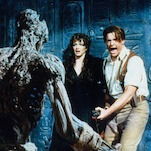Let us consider the evidence. First, there’s his half-baked alibi. Bennet claims he was at home on Friday night refinishing the floors—as one does—and that he’d sent his wife to stay with friends to avoid the fumes. The story is already pretty fishy, then Holder finds out it was Bennet who canceled the appointment and not the other way around. Also incriminating is Bennet’s track record for wooing his female pupils. Like Rosie, his young (and now pregnant) wife exchanged dreamy letters with Bennet while he was still her teacher, though she claims they didn’t start dating until after graduation. Most damning of all is the fact that ammonium hydroxide, the chemical Linden finds at Bennet’s house, is found all over Rosie’s body.
Of course, the economics of television (i.e. we still have 8 episodes to go) dictate that Bennet cannot be Rosie’s killer. Not to mention the fact that ammonium hydroxide—which, Wikipedia tells me, is just ammonia plus water—is not exactly hard to find. Most likely Bennet isn’t the murderer, but he definitely seems like the first step in the right direction. So far, he’s the only character personally connected to both Rosie and the Richmond campaign. For this reason, I’m guessing Bennet will remain the main suspect for at least another episode or two.
Now, allow me to complain a bit. Something that’s been quietly nagging at me since The Killing began is that I don’t feel tremendously invested in any of the characters. Everyone is interesting in that they all have dark secrets, but, with the possible exception of Holder, no one is particularly intriguing. Maybe this is just a problem inherent to the murder-mystery genre—that everyone is interesting in so much as he or she might be a killer. We’re not interested in what makes them tick, only in whether they have the motive and the means to take someone’s life.
Similarly, Rosie seems more a type—in particular, the “Dreamy Teenage Girl Who Likes Butterflies and Poetry”—than a person. To be fair, it can’t be easy to craft a comprehensive portrait of a character who is already dead and never appears in flashback. And in this episode, we do get closer to Rosie than ever before, via a Super-8 film she made. It’s a grainy assemblage of seemingly unrelated images—migrating monarch butterflies, waterfront views, shots of Rosie riding her bicycle through the woods. Linden obsessively watches it, hoping it will yield some clues. I watched it, hoping it would provide some sense of who this girl was supposed to be. I’m not sure if it did either.
The Killing has invited numerous comparisons to Twin Peaks because of the two series' obvious narrative similarities, but the shows have virtually nothing in common, tone-wise. Twin Peaks grabbed viewers with an irresistibly simple narrative hook but sucked them into a universe that was, by turns, dark, weird, funny and sweet. The show’s mood was at least as engrossing as its central mystery. So far, The Killing has piled on the atmospheric gloom and hinted at all kinds of dark secrets in everyone’s past, but it doesn’t have the same kind of magnetism as Twin Peaks. My interest in the narrative is intellectual, not emotional or visceral. Of course, it’s early enough that this could all change, and I hope it does.
This leads me to the next subject: Linden. This week, we learned virtually nothing new about our elusive protagonist. Just as he did last week, frustrated fiancé Rick expresses concern about her obsession with Rosie, asking “Are you going to put this girl’s drawings on your wall?” Linden assures him, “This isn’t the same thing, I’m a different person now.” I understand why the show is withholding information, but there’s a very delicate line between mysterious and repetitive. Likewise, we get some more information about Holder but mostly these little nuggets resulted in further questions. Chief among them: Dude, what’s with all the cash? Either he’s dealing drugs, running a lucrative prostitution ring, or just really, really good at Match Four. Also: whose mailbox was that?
The biggest development this week is over at the Richmond camp, where double-agent Jamie, galvanized by a little Jesus juice, sniffs out the campaign mole. Turns out it’s Nathan, the very guy Darren asked to spy on his own staff’s emails. Nathan is working for Yitanes, who was using the leaked information to pressure Darren into making more concession to the union. It’s a pretty good twist, but I’m more interested in where it will lead: Just how ruthless is this Yitanes broad, anyway?
As for Darren, like basically everyone else on this show, he also remains a bit of a cipher. Even his level of relative sleaziness is difficult to ascertain: Darren is justifiably horrified by Gwen’s suggestion that they ask the Larsens to film a commercial, yet he’s perfectly willing to stalk Mitch at the grocery store. Granted, when Darren does run into her, he’s sincere and empathetic, and he lies to Gwen about having seen her. So did Darren have a change of heart, or did he, all along, want to express his sympathy to the Rosie’s family face-to-face? In either case, all we know is he’s not totally soulless, and his wife is dead, which is pretty much where we were three weeks ago.
Then there are Rosie’s parents, who are still reeling from their loss. Stan is playing the tough guy, maintaining a stiff upper lip in front of his wife and kids but breaking down in private. His breakdown in a gas station bathroom was poignant—if a bit too long—but even more heartbreaking was the poker face he maintained when he got back into the car with Mitch, making up a lie about being out of oil. The Larsens’ relationship reminds me somewhat of Tom Wilkinson and Sissy Spacek in In the Bedroom: I always thought his performance was the more impressive one, his quiet demeanor barely concealing the rage roiling beneath the surface, and I’m reminded of it watching Brent Sexton in this role. Likewise, it appears that Stan is going to be the one to take action, as he gives the OK to having Belko’s friend find out about the investigation at Rosie’s school.
Stray observations:
- The dialogue between Mayor Adams and Jamie was both a little ridiculous and a tad pervy (“Finally, here comes the Jesus juice,” “I’ve had enough of the Tickle Me Elmo”). Or maybe it was just me?
- Surely, there must be a connection between the large butterfly on Rosie’s bedroom wall and the butterflies in her home movie.
- A sequence from Rosie’s movie shows a railing overlooking a body of water. I’m guessing this will not be a coincidence. Could this have something to do with the Mayor's waterfront development?
- Speaking of water, Mitch’s freak-out at the end of this episode was intriguing. Rosie drowned, so it’s understandable she would be spooked seeing her son in the bathtub. But is that it?
- Mitch runs into a friend at the grocery store, who basically treats her like a pariah. Would people really act like this if your daughter was murdered?
- Last but not least: Who else has Gwen slept with?








































